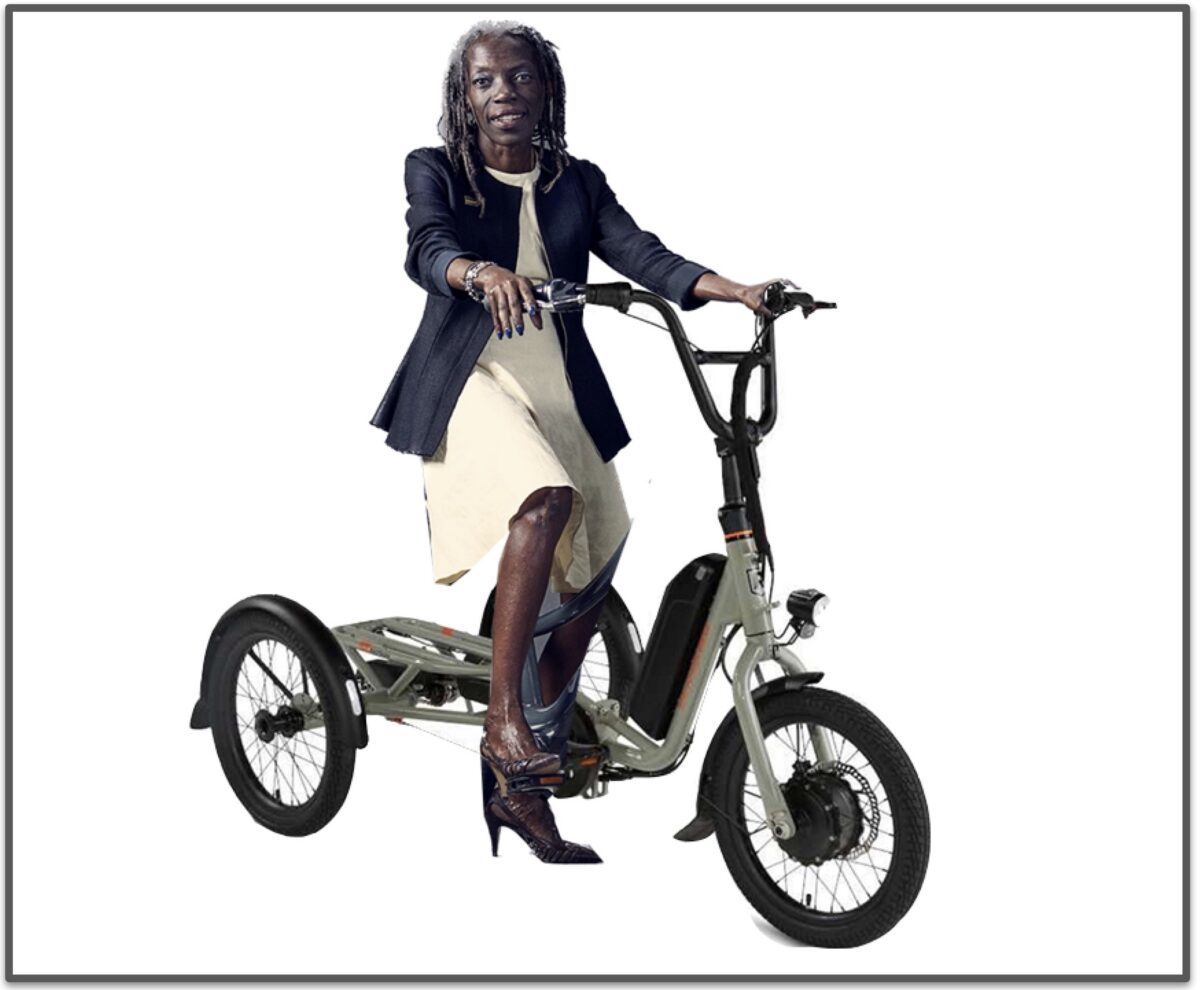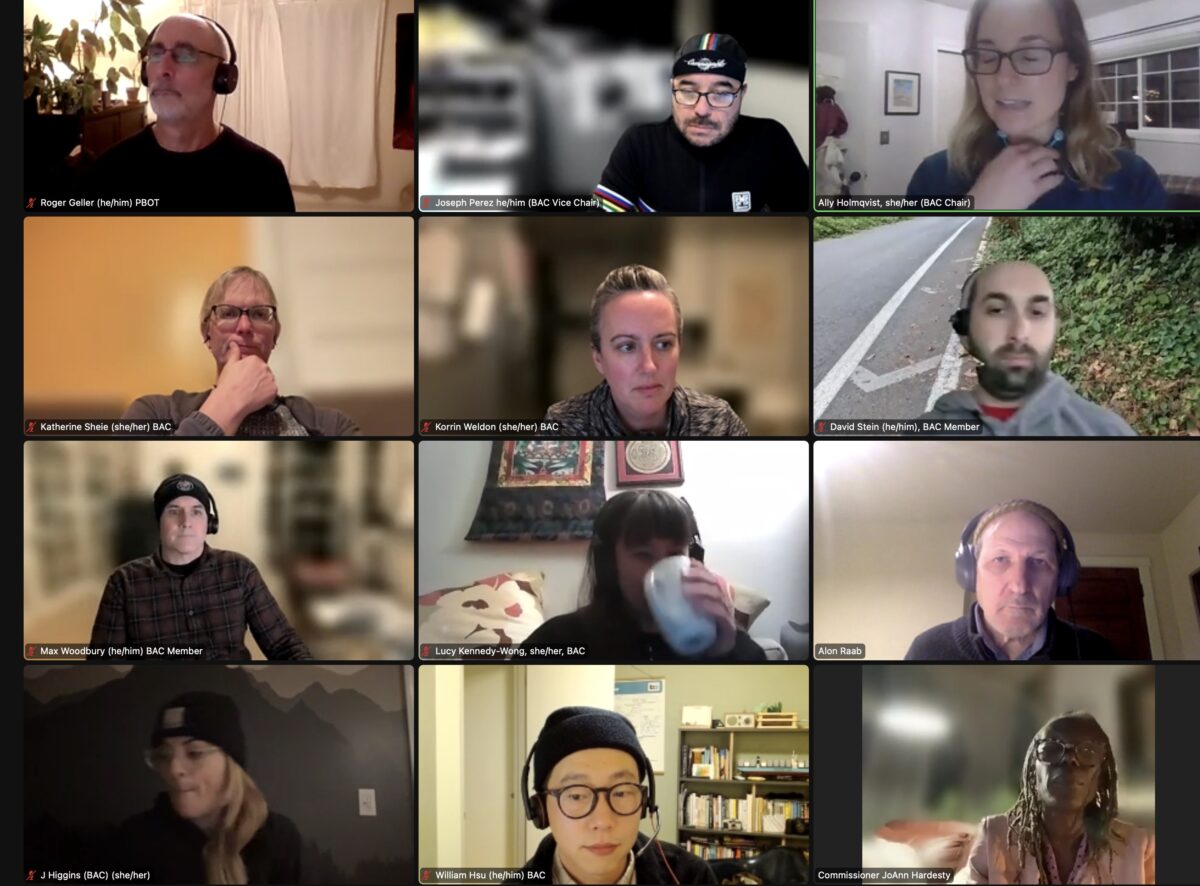
(Photos: City of Portland, Rad Power Bikes – Graphic: BikePortland)
“I think the charter change will be good for transportation in the long-term, because there’ll be one-stop shop for accountability.”
– Jo Ann Hardesty, city commissioner
As the elected official leading the Portland Bureau of Transportation for the last two years, Portland Commissioner Jo Ann Hardesty has spent time as City Council’s voice on all things transportation and infrastructure. But since she was ousted in November by incoming Council member Rene Gonzalez, Hardesty will soon be leaving her spot in city leadership and at PBOT.
Hardesty was given the PBOT assignment in January 2021 after serving on Council for two years. So, after this time navigating the ins and outs of PBOT, what does Hardesty think about where Portland transportation is — and where it’s going? She gave us some insights at last night’s Bicycle Advisory Committee meeting, and even included a few hints about her future plans. (Former PBOT Commissioner Chloe Eudaly gave a similar address before she left Council in 2021.)
As will be no surprise to anyone who paid attention to City Council dynamics over the last two years, Hardesty isn’t entirely optimistic about placing the fate of her assignments in the hands of the current local elected officials. She said Mayor Ted Wheeler and the rest of council will spend time, money and energy on moving Portland’s homeless population into massive outdoor encampments, potentially ignoring other areas.
“PBOT will continue to do the great work they’re doing, and hopefully won’t be pulled away from that work to do things just for downtown special interests,” Hardesty said.
Hardesty was an advocate for people in east Portland during her time as PBOT commissioner. Now that Council will lose its only member who lives east of 82nd Avenue, Hardesty is concerned city leadership will ignore everything outside of the central city.
“The way the council operates, no [commissioner] is supposed to represent an individual community. Their goals are supposed to be citywide,” she said. “But honestly, that just doesn’t happen unless they’re advocates or electeds who actually live outside of the downtown core and who care about other parts of the city.”
But Portlanders voted in November to change our government structure and create a system with more elected policymakers on City Council representing different parts of the city, which Hardesty (and transportation advocates generally) is looking forward to.
“I think the charter change will be good for transportation in the long-term, because there’ll be one-stop shop for accountability,” Hardesty said. “What I believe will happen is there will be more grassroots people who live in the community, and who will be bringing your voices to the City Council. So I think…we will actually end up in a better place to be able to have communities truly represented.”
Though Hardesty has earned praise from transportation advocates for her work creating carfree public spaces around the city and speaking up for east Portland, her relationship with activists hasn’t been all sunshine and rainbows. Bike advocates will recall her heated May 2021 meeting with the BAC when she revealed she didn’t know about Portland’s Bicycle Plan for 2030. To BAC members, this was indicative not only of a personal lack of familiarity of bike issues, but also demonstrated that PBOT was letting the once-glorified bike plan fall to the wayside. Hardesty reflected on this experience at the meeting last night.
“The first time I came and talked to [your committee], I didn’t know we had a 2030 bike plan. Who knew? Nobody told me as the transportation Commissioner,” she said. “I’m happy to say that I left that meeting and went and went online and found that 2030 Bike plan…are we making progress? The answer is yes. But as you know, covid really just sent everything into a tailspin.”
“I still have a lot of knife wounds in my back from the last campaign, so I’m not ready to commit to any public service at the moment.”
Perhaps the achievement Hardesty is most proud of from her time overseeing PBOT is getting 82nd Avenue transferred from the Oregon Department of Transportation to the City of Portland and set for big infrastructure projects coming down the pike. She said she plans to continue working on the 82nd Ave project — as well as weighing in on plans to expand I-5 at the Rose Quarter and with the Interstate Bridge Replacement Program — after she leaves office, though she didn’t say in what capacity.
“I’m pretty sure what I do next will continue around transportation. Because I don’t want to leave the I-5 Bridge, Rose Quarter and 82nd Ave to newbies,” she said.
As far as whether or not she’ll run for a spot in our larger city government in 2024? That’s not yet clear.
“I still have a lot of knife wounds in my back from the last campaign, so I’m not ready to commit to any public service at the moment,” Hardesty said.
The other big piece of news in Hardesty’s future? Possibly inspired by Rad Power’s recent product announcement, she wants to get an electric tricycle. “Just so you know, I stopped driving in March of 2020,” she said. “[An electric trike] is my next vehicle.” (Hardesty said since she weighs just 100 pounds, standard e-bikes are too heavy for her to handle.)
It’s still unclear who will be the next commissioner to lead PBOT. (Some suspect it will be Mingus Mapps — Hardesty said Wheeler has plans to reveal this next week.) Whoever gets the assignment has a big job ahead of them. With massive maintenance and budget concerns, Portland’s transportation bureau is a giant ship to steer.
At the end of Hardesty’s talk, BAC members thanked her for her work as PBOT Commissioner. Some people asking her to join their subcommittees and other groups. She didn’t commit to anything yet, but said people will still be able to tune into City Council meetings to hear her thoughts.
“Just be assured, I’m not going anywhere. You may not know this, but I have been I’ve been testifying at city council for 25 years,” Hardesty said. So if [the mayor] thinks I’m not going to still yell at him, he’s in for a rude awakening.”



